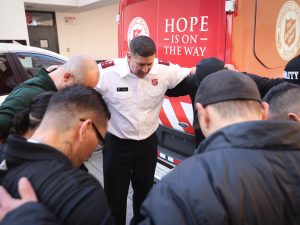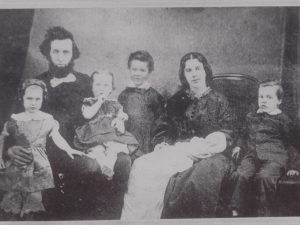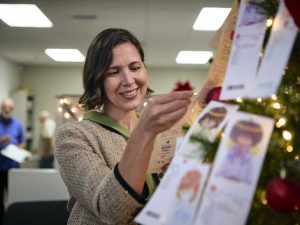As kids, our two favorite shows were “Sesame Street” and “Mister Rogers’ Neighborhood.” Both shows invited us into different worlds and introduced us to people we had never seen before. Mister Rogers, especially, was intentional about inviting lots of different people into his home. He was famous for calling everyone his neighbor.
You may be wondering: “How could everyone be my neighbor?”
It’s true, we tend to think of the people who live near us as our neighbors, not everyone. But God invites us to see and treat every person we meet with love and kindness as if they were our next-door neighbor.
Most of us would rather pick and choose who our neighbors are because it is hard to love everyone. Yet, throughout the Bible, God continually calls us to love everyone, to care for them and even invite them into our homes.
Over the next four weeks, journey with us in this study to see what God says about how to love our neighbors.
Each week includes five steps to follow with your family:
STEP 1: Prepare Your Heart—put away distractions and pray for God to show you something new.
STEP 2: Learn from the Word—read a passage of Scripture together.
STEP 3: Ask Questions—discuss the verses together as a family using the question prompts.
STEP 4: Name the Truth—discover the truth God wants you to take away using the reading thought material provided.
STEP 5: Take Action—think of ways you can put God’s truth into action and complete the action ideas on your Do Good Family Roadmap. (Consider setting a family reward for completing the full roadmap, such as an ice cream outing. Get input from your family and let everyone know you’ll enjoy the reward when you complete the neighborly actions as a family.)
So, in the words of Mister Rogers, “Would you be mine, could you be mine, won’t you be my neighbor,” as we journey through God’s Word?
Part four of four; read part three here.
STEP 1: Prepare your heart.
Put away distractions and pray, “God show us something new today.”
STEP 2: Learn from the Word.
As a family, read what Scripture says in John 9:1-25, 35-38.
STEP 3: Ask questions.
Discuss the passage together as a family. Consider:
- How would you react if a friend told you that they had been healed?
- Have you ever been made fun of or bullied because of your beliefs?
- What are some ways you can stand up for others who are being made fun of or bullied?
- How can you make sure you don’t make fun of or bully others?
STEP 4: Name the truth.
Discover the truth God wants you to take away. Use the following as a guide.
In this passage we see Jesus heal another person, but this time the reaction he receives is very different. No one rejoices or praises God. Instead, they begin to question this man who was born blind and the healing he received.
People who were blind or had other physical issues didn’t get a lot of support in Jesus’ time. In order to survive, this man had to beg for money and food—and beggars were looked down upon as outcasts in society. By healing this man, Jesus not only changed his sight, but Jesus also changed his entire life. The man could learn to read and study, get a job in his town and support himself for the first time in his life.
This man probably expected his neighbors to rejoice with him, to praise God for this miracle, but instead his neighbors didn’t believe him. They even took him to the Pharisees, the local church leaders who made sure people were following the rules and laws of God. These people of God should have believed him but instead they kept questioning him and even called his parents to see if he was telling the truth! Not even his parents defended him.
No one believed his story, and yet this man kept defending Jesus and the healing he received every time the Pharisees questioned him.
Unfortunately, the Pharisees did not like Jesus, and continued to attack everything he did—and that sometimes included the people he healed. Instead of seeing the miracle before them, they got caught up in the rules and attacked this man and Jesus. Jesus did an amazing thing for this man, but they refused to see it. They remained caught up in their rules and anger and became even more blind than the man Jesus healed.
Have you ever refused to be someone’s friend because they hung out with another person you didn’t like? Have you ever seen someone making fun of somebody who was different or an outcast? Have you ever been the one being made fun of?
This passage shows how hurtful we can be to other people and why it is important to speak up for our friends and neighbors when other people are attacking them. Even when the Pharisees questioned him and his parents didn’t help him, the man who was healed always defended Jesus. Because of his faith, the man was rewarded not just with healing but with eternal life.
STEP 5: Take action on your Do Good Family Roadmap.
Put God’s truth into action and be a supportive neighbor this week with these action ideas (and don’t forget to mark them complete on your roadmap!):
- Take an anti-bullying pledge. Have your family take this pledge, maybe even creating it as a work of art to hang in your house:
- I Promise to:
- Support others who have been hurt or harmed.
- Treat others with kindness.
- Be more accepting of people’s differences.
- Help include those who are left out.
- I Promise to:
In this discussion, you could also watch the YouTube video: “Protect Yourself Rules – Bullying.”
- Think out loud. Give your family ethical dilemmas to grapple with. What should they do when a schoolmate tells them bad things about another child? When they see someone cheating on a test or stealing? When they’ve done something wrong and are afraid to admit it to their parents or caretakers?
- Join up. Provide opportunities for your family to join causes, whether it’s reducing homelessness, supporting girls’ education in developing countries, calling attention to the plight of abused animals, or any area that is of interest to them.
- Practice self-control. A simple way to help your family manage their feelings is to practice three easy steps together: stop, take a deep breath through the nose and exhale through the mouth, and count to five. Try it when everyone is calm. Then, when a member of your family gets upset, remind them about the steps and do them together.
You made it to the end! Be sure to celebrate with your planned family reward and don’t stop here—challenge your family to continue looking for ways to be a good neighbor.
Download the complete Do Good Family Roadmap now and take a 4-week journey for families in how to be a good neighbor. Follow the guide to see what the Bible says about the art of neighboring and take tangible steps together on your printable roadmap to be a caring, helpful, welcoming and supportive neighbor right where you are.
Do Good:
- How do we treat everyone with love and kindness, as if they were our neighbor? Get the Do Good Family Roadmap and take a 4-week journey for families in how to be a good neighbor. Follow the guide to see what the Bible says about the art of neighboring and take tangible steps together on your printable roadmap to be a caring, helpful, welcoming and supportive neighbor right where you are.
- You’ve probably seen the red kettles and thrift stores, and while we’re rightfully well known for both…The Salvation Army is so much more than red kettles and thrift stores. So who are we? What do we do? Where? Right this way for Salvation Army 101.
- Get support from moms who are right there with you. Join the Caring Moms Collective and find a place of low-pressure, high-encouragement love anytime you need it, whether you know it or not. Get in the group today.












